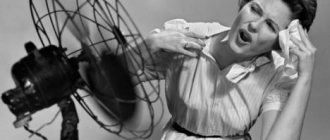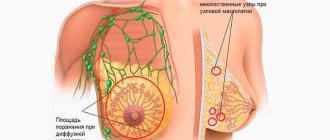Menopause is a complex physiological process that causes a woman a lot of inconvenience. Many representatives of the fair sex experience severe mood swings and depression. In some cases, a woman needs antidepressants during menopause; they help cope with anxiety and irritability. Thanks to these medications, the fair sex will be able to return to a normal lifestyle. Antidepressants do not contain hormones and do not have a negative effect on a woman’s health.
Basic rules for treatment with antidepressants during menopause
Previously, women during menopause were prescribed hormonal medications, but now these medications are used quite rarely. They have an impressive list of contraindications and cause unwanted side effects, so these medications can only worsen the condition of a patient suffering from depression. Antidepressants act mildly, they do not cause drowsiness and are well tolerated by women.
These medications eliminate anxiety, depression and apathy. But when treating with these drugs, you need to follow certain rules:
- The medicine must be prescribed by a specialist. Self-medication should not be done under any circumstances.
- The dosage of the antidepressant should be increased gradually. This is done to ensure that the body adapts to the drug.
- It is not allowed to abruptly stop treatment with antidepressants: the dose of the drug should also be reduced gradually.
- The active substances of the drug accumulate in the body over several days, so positive changes will be noticeable no earlier than after five days. Some medications begin to act only after 14 days, therefore, a woman needs to be patient and should not expect instant results.
Depression during menopause
Depression that women suffer during menopause can be divided into several types: menopausal, endogenous, involutional or psychogenic.
Menopausal depression is characterized by:
- the appearance of a sad mood,
- loss of interest in everything around you,
- the appearance of passivity,
- anxiety,
- insomnia,
- loss of appetite,
- night hot flashes,
- profuse sweating.
Psychogenic depression can be characterized by increased feelings of guilt or remorse, sudden weight loss, the appearance of heavy thoughts, pessimistic mood, and sleep disturbances. This type of depression can fluctuate, then become more clear, then subside for a while.
Red clover for menopause
Red clover contains phytoestrogens. This plant reduces the likelihood of developing breast cancer and improves the function of the cardiovascular system.
Clover contains not only phytoestrogens, but also a large number of other biologically active substances: it is rich in vitamins and antioxidants.
This natural antidepressant should be used for the following reasons:
- Clover helps increase sexual desire in women.
- The plant improves sleep and eliminates anxiety.
An infusion of red clover is prepared according to the following scheme: 20 grams of plant material are poured into 200 ml of boiling water, the drink is infused for at least 8 hours, after which it is filtered. You need to drink 50 ml of red clover infusion twice a day. The duration of the treatment course is at least 10 days.
Drugs
Antidepressants for menopause are usually mild. However, they are always sold by prescription, so you will have to see a doctor in any case.
Medicines will help cope with anxiety, mood swings, irritability and other manifestations of the disorder.
The drug dosage regimen is prescribed individually. The doctor focuses on your symptoms, their frequency and intensity. The effect of the drugs is cumulative, so you will have to wait.
https://youtu.be/ioul7mKvg3g
Modern medications, when taken correctly, rarely cause side effects.
The following medications are prescribed: Efevelon, Adepress, Depakine, Finlepsin, Paroxetine, Coaxil. This is a small list of antidepressants for menopause in women.
Stopping therapy without medical supervision is prohibited. This will cause withdrawal symptoms.
Persen during menopause
Persen is a herbal preparation. It is endowed with sedative properties. This antidepressant contains extracts of medicinal plants: valerian, mint and lemon balm. Persen helps cope with increased nervous excitability and irritability, and normalizes sleep.
This antidepressant should not be taken if you have lactose intolerance, low blood pressure, pathologies of the biliary tract, or individual sensitivity to the components of the drug. Women with chronic diseases of the digestive organs should use Persen with caution.
For insomnia that occurs during menopause, you need to drink 2 tablets of the drug 30 minutes before bedtime. It is recommended to take Persen with a sufficient amount of liquid. The duration of the course of treatment is at least 45 days.
When using Persen during menopause, the following side effects may occur:
- Allergic rash.
- The appearance of peripheral edema on the body.
- Spasm in the bronchi.
Why does depression occur during menopause?
Of course, not all women during menopause experience such problems, but only 15%, but this does not mean that such a condition can be left to chance when modern medicine knows what causes it and how to help a woman. Depression during menopause is caused by the following factors affecting the female body:
- Menopause is a total restructuring of the entire body, and this is primarily due to hormones. This is especially true for the main female hormone estrogen: its amount in a woman’s body constantly fluctuates. The hormone estrogen is responsible for the brain's production of another hormone, serotonin. It is this hormone that is responsible for joy and good mood, and since its level also drops, the woman’s mood is not in the best condition.
- Psychological reasons . Many representatives of the fair sex find it difficult to accept menopause as such, as they come to the realization that the main female function, which is giving birth to children, is lost, certain changes occur in the body, and thoughts about impending old age involuntarily come to mind. Of course, such a state does not contribute to boundless joy and uplifting of spirit.
- Health problems . With the advent of menopause, certain health difficulties arise. A woman often experiences hot flashes, night sweats, dizziness, insomnia, muscle pain, and frequent urges to go to the toilet. It's hard to stay cheerful and cheerful when something is constantly bothering you.
Attention! Not every woman will be prescribed antipsychotics or other drugs with similar effects by her doctor. Some will need the help of a psychologist, while others will only need traditional menopause treatments.
What do the reviews of the fair sex indicate?
Drugs such as Persen and Femicaps have earned favorable reviews from women. Representatives of the fair sex note that after using these medications, their sleep improved and the feeling of fatigue disappeared.
But in order to improve the condition of the nervous system, you need not only to take antidepressants, but also attend a relaxing massage session and take pine baths. A woman can also master muscle relaxation techniques. Menopause does not have to be accompanied by depression and apathy.
Symptoms
If you notice the following symptoms, consult your doctor. Symptoms:
- constant feeling of depression;
- anxiety;
- insomnia, low self-esteem;
- lack of motivation;
- mood swings;
- irritability;
- photophobia.
https://youtu.be/4epLEzVtL68
The disease also often manifests itself as sleep disturbances, stomach upsets, increased thirst, and dizziness. Women become whiny. Never take sedatives on your own. Doctors prescribe antidepressants for women during menopause.
Risk factors
The two most significant risk factors for acute mood swings during menopause are:
- history of severe premenstrual syndrome (PMS);
- history of bouts of depression or other significant mental disorders before menopause.
Additionally, a woman may have an increased risk of emotional problems during menopause if she has experienced:
- unsatisfied relationships with loved ones;
- difficult life situation;
- multiple stresses.
Hormones during menopause: estrogen instability as a cause of depression
Unreasonable attacks of aggression are one of the unpleasant signs of asthenic syndrome
Medicine has long known that hormonal changes often cause various nervous disorders. There are statistics: depression occurs twice as often among representatives of the fair half of humanity*. Doctors record the peak of depressive disorders during those periods of a woman’s life when her body is endocrine unstable (for example, adolescence and the postpartum period, menopausal transition).
The biological model of the formation of depression is now well studied. According to experts in the field of endocrinological psychiatry, we are most vulnerable to the threat of nervous disorders at times when estrogen levels fluctuate**.
During perimenopause (it begins approximately four years before menopause and lasts for a year from the date of complete cessation of menstruation), the most significant changes in hormonal levels occur. “Hormonal swings” (namely, “unbalanced” estrogens during menopause) become provocateurs of emotional disorders. Interestingly, with the onset of “even” menopause, the risks of depression decrease.
Is depression during menopause normal or pathological?
During non-surgical menopause, as well as during the surgical period (after removal of the ovaries), women may experience mental disorders of the borderline circle. And depression is often observed in this state.
During menopause, a number of pathophysiological and behavioral mechanisms that cause depression can be observed.
It should be noted that in women who suffered from depression at an earlier age (20-30 years), menopausal depression is more likely to manifest itself.
It is important to understand that women who have had surgical removal of their ovaries and who go through surgical menopause have an increased risk of developing depression.
Hormonal disorders in menopause
This period is characterized by a restructuring of the hormonal balance of the woman’s body; the level of estrogen (female sex hormones) secreted by the ovaries decreases. This leads to a decrease in the synthesis of tryptophan, a precursor of serotonin - the so-called happiness hormone, responsible for a good mood. Therefore, as a result of the above disorders, a decrease in serotonin may occur, which is pathogenetically the basis for the development of depression.
Psychological aspect
During menopause, it is difficult for a woman to accept the fact that her reproductive function ceases and she will never become a mother again. This especially affects those who did not have time to start a family before this time or have problems in their personal lives.
Loss of contact with loved ones
As a rule, after 45 years, children leave and the family stops living together. Loss of contact with relatives and a feeling of loneliness, as well as fear of the unknown, also plays a significant role in the development of depression during menopause.
Associated somatic disorders
In addition to all the listed changes, other health problems appear during menopause: general malaise, dizziness, sleep disturbances, irritability, increased sweating, hot flashes, weakness and muscle pain.
Skin elasticity is lost and signs of aging appear. These manifestations contribute to the emotional background. In addition, the cardiovascular system suffers, which manifests itself in the form of high blood pressure and rapid heartbeat. All this can provoke the occurrence of secondary depression.
Bad habits
Smoking, alcoholism, and poor nutrition can also aggravate menopausal symptoms and lead to an increase in the occurrence of depression.
Rhythm of life
The modern rhythm of life and the fact that women are increasingly becoming equal professionally with men also play an important role. After all, representatives of management professions or law enforcement agencies are subject to much more stress than housewives.
Increase in subcutaneous fat
During menopause, the production of estrogen when ovarian function fades is partially taken over by adipose tissue and the adrenal glands. Accordingly, we compensate for estrogen production by increasing the volume of the subcutaneous fat layer. Thus, a natural replacement mechanism occurs, and the woman gains weight, but this does not improve her mood.
Prevention of depression
During the transition to a new age stage, it is important for a woman to pay more attention to herself. To prevent depression during menopause, you must follow some rules:
- To avoid depression during menopause, you can take mild sedatives.
- Herbal teas with a sedative effect help cope with insomnia, normalize the functioning of the nervous system and improve mood.
- You can relax in other ways - with massage, meditation, an aromatic bath.
- It is important to treat all chronic diseases in a timely manner, since they worsen during menopause.
Menopause is a difficult but natural period in the life of every woman. In order for it to pass unnoticed and painlessly, you should prepare for it in advance.
Sources
- https://medmaniac.ru/perepady-nastroeniya-pri-klimakse/
- https://depressia.info/depressija-vo-vremja-klimaksa/
- https://CriticalDays.ru/klimaks/depressiya.html
- https://ovulyacia.ru/klimaks/depressija
- https://psyhosoma.com/depressiya-pri-klimakse-prichiny-proyavleniya/
- https://indepress.ru/depressiya/pri-klimakse.html
- https://karma-laws.ru/perepady-nastroenija-pri-menopauze/
- https://ginekologi-msk.ru/info/articles/depressiya-pri-klimakse/
- https://prirodushka.ru/bolezni/m/menopauza-klimaks
- https://stopclimax.net.ru/klimaks-i-nastroenie/
- https://vmenopauze.ru/obshhee/perepady-nastroeniya-pri-klimakse.html
- https://TopGinekolog.ru/klimaks/depressiya
[collapse]
Rules for taking antidepressants during menopause
In order for a sedative to be effective during menopause, you must follow the following rules for taking it:
- start treatment only after the doctor’s permission;
- adhere to the dosage and schedule;
- do not interrupt the course of treatment;
- During therapy, eat properly and nutritiously , and devote time to relaxing procedures.
Sedatives for menopause are taken mainly by prescription, but you can buy them at any pharmacy. The price of domestic and imported drugs can vary significantly.









